
Currently, I have 63 tabs open with a total of 44 Chrome processes running. I have no idea how Chrome's internals work, but it's clear to me that tabs are somehow shared among processes. (Chrome is different from Firefox: Rather than running a single tab per thread under a single process, Chrome runs approximately one process per tab.) Why is this interesting? It's interesting because processes are heavier than threads. They consume slightly more resources and, under Windows, are significantly more expensive to create. However, building applications with a process--not thread--model is more stable. If a single process crashes, you can restart it. When using threads, a single thread crash can tear down the entire application.
If you're getting fed up with some of the problems Mozilla has introduced as of late and are testing other browsers, Chrome might be worthwhile. I can't really say it's significantly more lightweight than Firefox, but it does appear to be safe from leaks:

Here's the Firefox stats

Using the working set as a reasonably fair comparison: Chrome averages a little over 2 megs per tab (yeah, I know, some get paged out). Firefox manages about 3 and a half megs.
I don't think either browser is built with my particular use case in mind.


